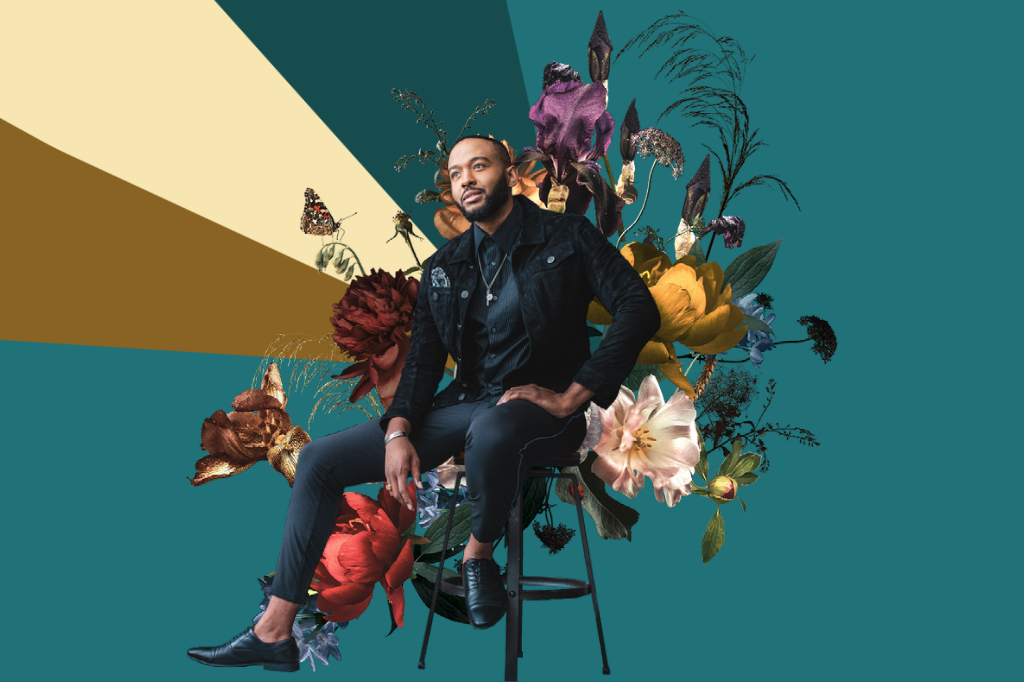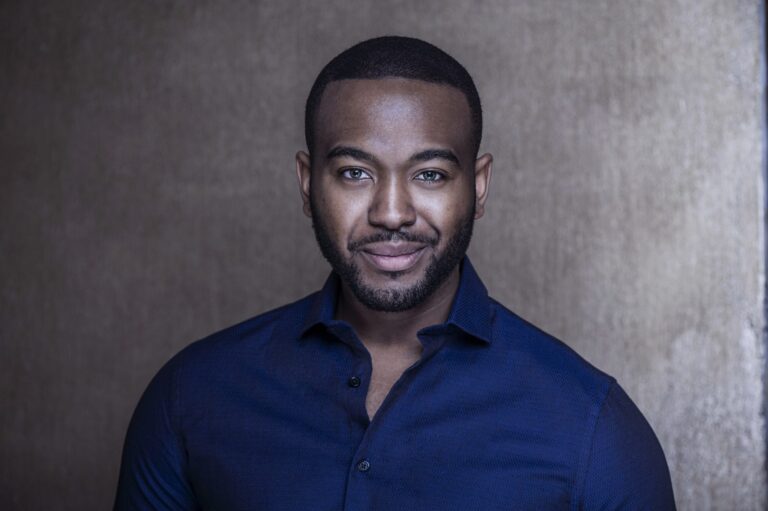A Path in the Right Direction: Stepping into New Shoes as a Multifaceted Artist
Leighton Alexander Williams is a stage and screen actor, writer, director and producer based in Toronto, ON. He is thrilled to have been nominated to receive the 2021 Pauline McGibbon Emerging Director Award.
I used to refer to myself as “just-an-actor-with-big-ideas”. There were stories I wanted to tell, scripts I wanted to produce, but stepping into the role of a director, writer or producer always seemed too intimidating. Many actors have the same hesitation when it comes to stepping to the helm of a production; having come out the other side, I would encourage them all to take the leap! There is a great deal of responsibility in sharing your vision with and guiding a team—but it can also be incredibly rewarding.
The acting bug bit me in second grade when I was cast in a musical called “A Bugz Life”. I only had one line, but I remember seeing my mother’s face in the audience, beaming with pride. From that day, I made it my goal to recreate that look on her face through storytelling—I knew I wanted to become an actor. So I set my sights to training and worked hard to put myself in the best position possible to succeed in the industry and make my mother proud.
I graduated from York University’s Acting Conservatory five years ago. Because I wanted a “backup plan” in teaching, I’d taken an extra year to get the necessary credits I’d need to be eligible. In that year, I tried to book all the non-union work I possibly could before being forced to join the union. But, like most theatre school alumni, my acting career wasn’t accelerating as fast as I would have liked. While I was booking independent theatre roles and doing fringe shows with friends, larger gigs were not falling into my lap, and my career in film/tv was non-existent. It felt like I was constantly going out for roles that didn’t really allow for me to showcase my range (hello, guard #2), and I wasn’t getting the meaty, challenging roles I’d dreamt of in drama school. I realized that if the opportunities I wanted weren’t coming to me, I figured I had to make them for myself—I’ve spent these past five years creating the unapologetic, thought-provoking work that I had been unable to find as an actor.

My first opportunity to direct came in 2016 after my script was selected to be a part of the Piece of MINE festival. It was a project I developed from my thesis performance at York, “The Adonis Project”. I submitted this piece in particular because it allowed me to tell a story that drew audiences in with comedy and the universal themes of beauty and perfectionism. I also hadn’t had the opportunity to play a character with such a wide range of emotion, in a story arc—selfishly, I knew it was the perfect opportunity to show my full acting chops. I didn’t have enough money to hire a director, so I knew I’d have to fill those shoes myself if I wanted to tell this story. So not only was I going to be acting in a piece that I had developed myself, but I was also the one in charge of executing and organizing my vision of the piece.
At the time, the title of “Director” terrified me for many reasons—I knew that it required a lot of work to lead a production, but I wasn’t really sure what the job requirements were, especially when pulling double-duty as an actor and director. I feared being good at directing; so good that I might no longer be seen as an actor. In retrospect, that may seem silly, but it’s a huge step to take. Acting was and is my first love and the idea that I might be stepping out of those shoes permanently terrified me. Little did I know that working as a director would allow me to grow as an actor in ways that I hadn’t even imagined.
In acting programs, there is the cardinal rule of never giving your scene partner any notes. You work with what the other actor is giving you and focus on living your objectives—you let the director worry about the rest. While directing a show I was also acting in, I had to break that golden rule… and I found it oddly satisfying. Because I had a clear vision for the piece, I was able to have my scene partner(s) react in a way that gave me what I needed for my character and my vision of the show as a whole. It’s like having an audition go exactly how you rehearsed it—you feel accomplished. Ultimately, the entire experience allowed me to gain confidence in directing because I shifted how I looked at the job. Instead of seeing it as an unattainable mountain of responsibility, I focused on the perks and how it allowed my creative vision to flourish.
Directors love working with actors who come with ideas and solutions, who add to the vision. In the past, I’ve worked alongside a handful of actors who would simply present problems, and hope that their director would find the solution. It’s important to remember, theatre is a collaborative partnership; the best actors are ones that take the reigns of their craft and come ready to work and open to receive. The best directors are the same; they have a strong vision, a clear plan, and an ever-so-slightly open mind. I would advise any artist who is looking to direct to really figure out what the piece you want to direct means to you. What do you need from your actors? What do you want to say through the telling of this story, and why now?
I fell into the world of Directing/Producing through the NEED to act and tell the stories I valued, and I stayed because I recognized that you can shape a story a lot more from the Director’s chair. My bruised actor-ego quickly learned to love this chair. I realized that what I lacked in “experience”, I made up for in taste. And one’s artistic taste plays a big part in creating and executing an artistic vision. That’s why I co-founded Big Dreamers Brotherhood Productions Inc., a company of six other black male artists—all with the desire to tell stories that resonate with audiences in at least one of three ways: provoke them mentally, move them emotionally, and entertain them wholeheartedly.

BDB was created with the goal of producing current, relevant and meaningful content on an elevated, accessible platform. We wanted to blur the line between Canadian and US content, telling progressive stories that reflect some of the most topical societal issues we face today, with imagination and heart. In 2018, we mounted a production of Judas Noir, my own adaptation of Stephen Adly Guirgis’ The Last Days of Judas Iscariot. It’s one of my favourite plays, and had recently been auditioned for another production of the original script. When I wasn’t cast, I knew I couldn’t wait around for another couple years to get a chance to tell that story, and play the role I coveted. So I reached out to Stephen Adly Guirgis, and asked for permission to adapt his piece into something incredibly current: Henrietta Iscariot, defending her son from public opinion. The resulting show was eerily similar to the countless Black Mothers who have been forced to defend their sons murdered by police brutality. This parallel inspired me to look for further connections between what the Jewish people faced in this archaic period and what is going on today in Black America.
I believe Judas Noir resonated with audiences because of how raw the emotionality was. I challenged the actors to think big, feel big, and most importantly, trust their impulses. It was a show that wasn’t heavily blocked—I wanted the actors to continue exploring new moments each night, to keep it very present. With text heavy material, it is important to make the words matter, and not fall into auto-pilot mode, or you will lose your audience. I believe that our body is poetry. Movement is such a rich language, and although I’m not a professionally trained dancer, I’ve incorporated dance and movement in everything I’ve directed. It’s become part of my directorial signature. I fell in love with movement theatre after acting in a play called The Stronger Variations, directed by Allyson McMackon. She really challenged me to stand tall and use my whole being to tell a story, because “I’m more than just a talking head”. Since then, I’ve always tried to ask myself, how can we get the story out, with fewer words? This was a major reason why I added a 10-minute long dance number in Judas Noir. As Satan tells Judas what hell is like, I thought it would be interesting to have Judas dance with the devil, creating an image of hell that challenges our preconceived notions.
Judas Noir gained us our first Dora Nomination (Best Ensemble) and my very own Toronto Critics Pick Nomination (Outstanding Supporting Performance). In addition, I became the recipient of the 2018 Premier’s Emerging Artist of the Year Award, which was a loud and much-needed reminder that my voice matters in this world, and I am capable. I couldn’t say if I would have received those nominations if I hadn’t taken the steps to create the work I wanted to see, to perform in. Maybe it was just my poor luck as an actor, but the most successful productions I’ve been in have been the ones I was ballsy enough to write. The universe has a funny way of rewarding those who help themselves, but you have to “earn help”.

I find it incredibly difficult to come across new material in Canada that offers timely content. I see tons of workshop opportunities for new scripts to be developed, but what next? There needs to be a push to get fresh content out on bigger stages and platforms; the indie community is incredibly supportive and open to sharing opportunities, but that support is sometimes lost in the larger theatre community. The talent is there, it’s just not being showcased, or the opportunities aren’t being publicized enough.
Unfortunately, Covid-19 has thrown a nasty curveball at everyone—whether you’re an emerging or established artist, transitioning from acting to directing, writing your first play or an enthusiastic audience member. To all those entering this industry in these unprecedented times, I urge you to breathe. In the moments when things are slow, find at least one thing you can do a day to further your career. Whether it’s writing, exercise, having a tough conversation, working on a special skill, an accent, build your toolkit—for once, you have the time! For anyone looking to keep their creative spark lit, I would highly recommend Julia Cameron’s three-month program called “The Artist’s Way”. It has really helped my creativity stay alive in a time when I was feeling burnt out, and I know it will do the same for others. I’ve also taken a 10-week directing course during lockdown, and serendipitously booked a directing gig the same week I enrolled. Opportunities come when we least expect them, so keep training, learning and exploring your creativity!
I had thought that my momentum as a theatre director was placed on indefinite hold, until just two months ago, when I was given the opportunity to be a part of Obsidian Theatre’s “21 Black Futures”. The first-ever Canadian amalgamation of its kind: a televised theatre series. In my opinion, the beauty of theatre is the audience becoming a scene partner: their laughter, their shades of silence, their sniffles in the dark as they see themselves in the light. As a multi-faceted artist, I’m learning to reveal what I know about the human condition no matter which hat I’m wearing.

I was thrilled to work on another piece that speaks to our current times. We see the negative effects systemic isolation has on one’s mental health—as our lead character spirals downward into bad choices for the sake of survival. This story is pertinent in this day and age, because of the Covid-19 lockdowns, which were catalysts for a spike in: unemployment, suicides, addiction to illegal substances, famine, etc. Dichotomously, this story exhibits unity as a major theme: depicting a future where the Black diaspora steps into our collective power. I thought it was important to shape Jacob’s play into a love letter; Dear Black Women, we love and need you, sincerely Black Men. In all the challenges Adrian faces in his life, his saviour is “the Black Woman”. With the recent/current civil war in North America regarding Black Lives Matter, our Black women were at the frontlines for fallen brothers; but when the role was reversed: when our girls go missing (Oluwatoyin), when they are flung from their apartments (Regis), when they are slain in their sleep (Breonna), where are our Black Men’s voices? After recently losing my beloved Grandmother last year, it was important for me to focus on the power of Black love. My hope is that this little film sparks trust again, between the Black Man and Woman.
Whenever I get overwhelmed while directing, I find my feet and gently ask myself “what are you trying to say?” I used to roll my eyes at all the hours spent on finding breath and grounding oneself in theatre school—but it was super worth it. Acting was my first love, but I’ve come to realize that I don’t have to give it up to pursue other paths; directing has benefitted me as an actor as much as acting has benefited me as a director. I haven’t given up on acting. I haven’t given up on storytelling. We all have the opportunity to explore everything this industry has to offer and let our voices be heard. I’m loving the Director that’s emerging within me; thank you for seeing me.









Comments